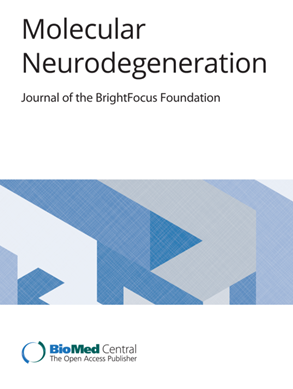Altered plasma protein profiles in genetic FTD – a GENFI study
IF 14.9
1区 医学
Q1 NEUROSCIENCES
引用次数: 0
Abstract
Plasma biomarkers reflecting the pathology of frontotemporal dementia would add significant value to clinical practice, to the design and implementation of treatment trials as well as our understanding of disease mechanisms. The aim of this study was to explore the levels of multiple plasma proteins in individuals from families with genetic frontotemporal dementia. Blood samples from 693 participants in the GENetic Frontotemporal Dementia Initiative study were analysed using a multiplexed antibody array targeting 158 proteins. We found 13 elevated proteins in symptomatic mutation carriers, when comparing plasma levels from people diagnosed with genetic FTD to healthy non-mutation controls and 10 proteins that were elevated compared to presymptomatic mutation carriers. We identified plasma proteins with altered levels in symptomatic mutation carriers compared to non-carrier controls as well as to presymptomatic mutation carriers. Further investigations are needed to elucidate their potential as fluid biomarkers of the disease process.血浆蛋白谱在遗传性FTD中的改变-一项GENFI研究
反映额颞叶痴呆病理的血浆生物标志物将为临床实践、治疗试验的设计和实施以及我们对疾病机制的理解增加重要价值。本研究的目的是探讨遗传性额颞叶痴呆家族个体的多种血浆蛋白水平。研究人员使用针对158种蛋白质的多重抗体阵列分析了来自遗传额颞叶痴呆倡议研究中693名参与者的血液样本。当比较诊断为遗传性FTD的人与健康的非突变对照组的血浆水平时,我们发现有症状的突变携带者中有13种蛋白质升高,与症状前突变携带者相比,有10种蛋白质升高。我们发现,与非携带者对照和症状前突变携带者相比,有症状突变携带者的血浆蛋白水平发生了改变。需要进一步的研究来阐明它们作为疾病过程液体生物标志物的潜力。
本文章由计算机程序翻译,如有差异,请以英文原文为准。
求助全文
约1分钟内获得全文
求助全文
来源期刊

Molecular Neurodegeneration
医学-神经科学
CiteScore
23.00
自引率
4.60%
发文量
78
审稿时长
6-12 weeks
期刊介绍:
Molecular Neurodegeneration, an open-access, peer-reviewed journal, comprehensively covers neurodegeneration research at the molecular and cellular levels.
Neurodegenerative diseases, such as Alzheimer's, Parkinson's, Huntington's, and prion diseases, fall under its purview. These disorders, often linked to advanced aging and characterized by varying degrees of dementia, pose a significant public health concern with the growing aging population. Recent strides in understanding the molecular and cellular mechanisms of these neurodegenerative disorders offer valuable insights into their pathogenesis.
 求助内容:
求助内容: 应助结果提醒方式:
应助结果提醒方式:


